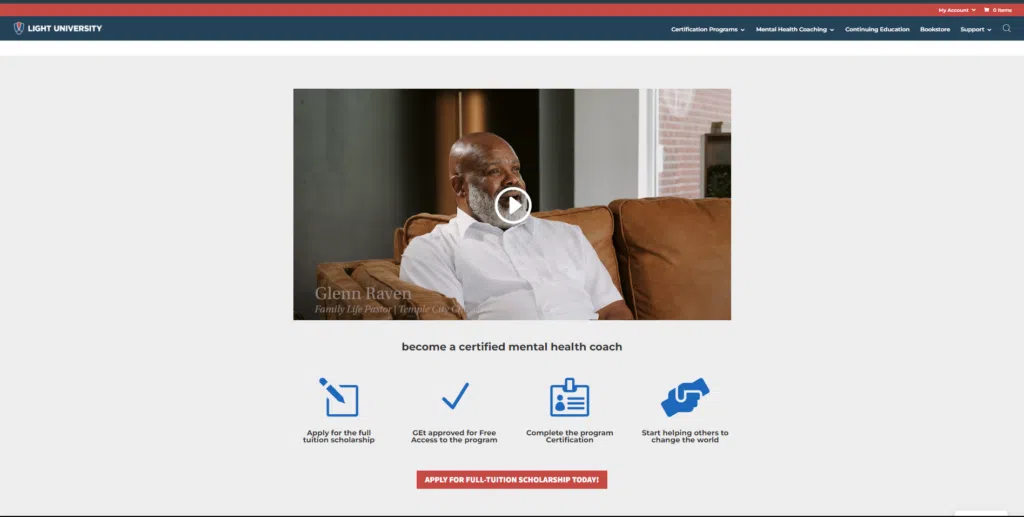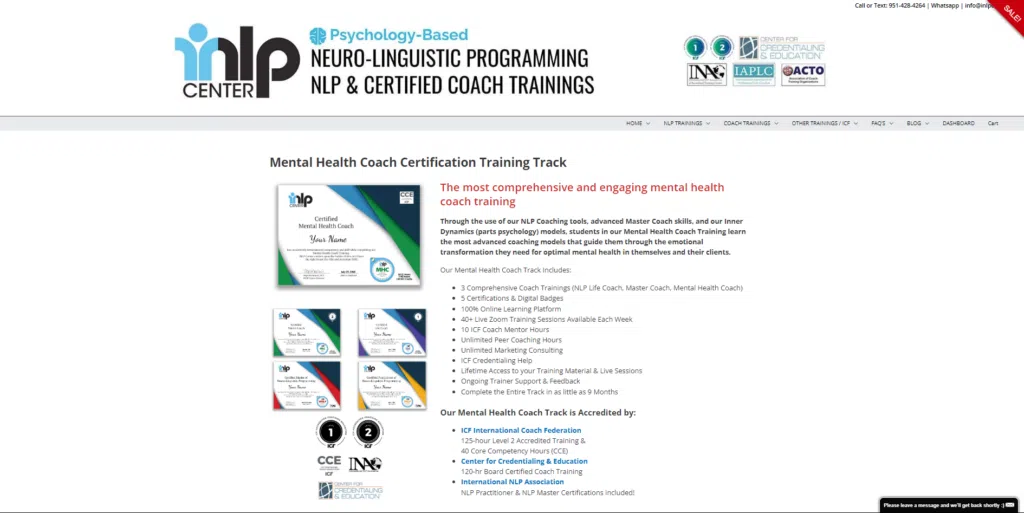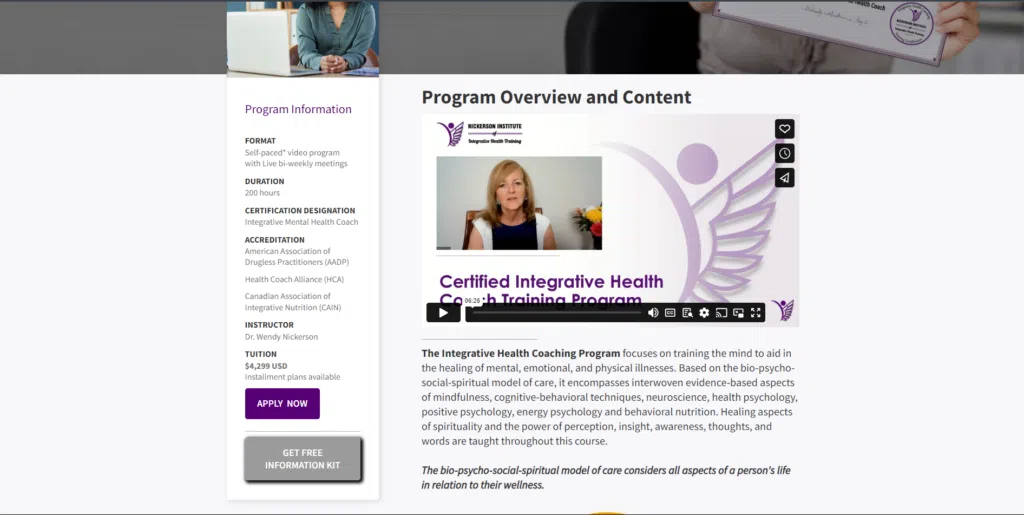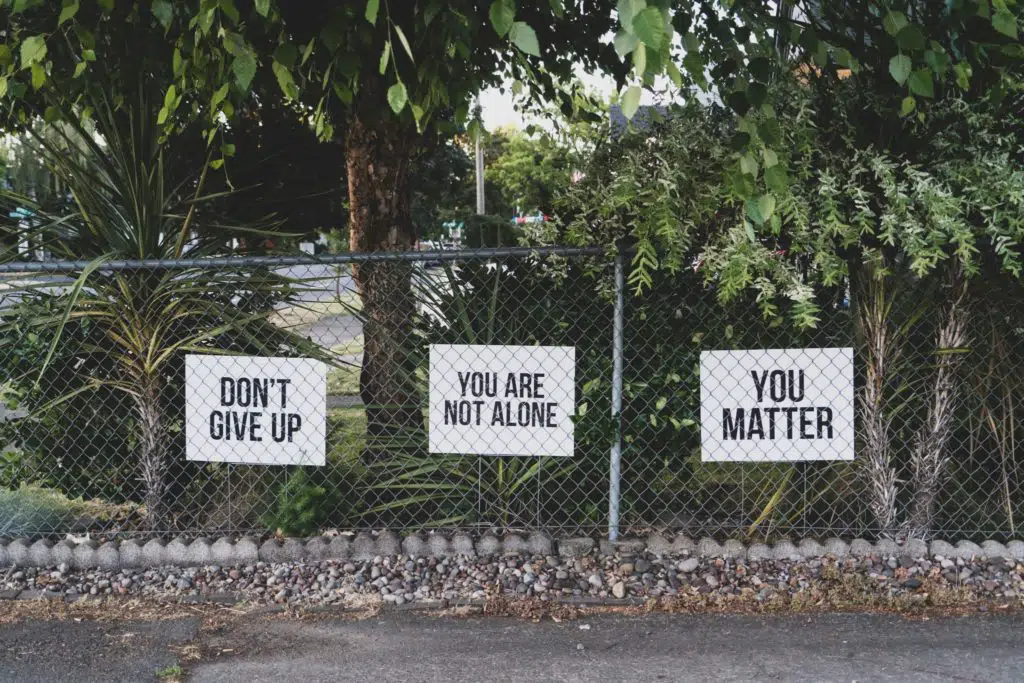Are you passionate about supporting others in their journey to better mental health and well-being? Interested in becoming a mental health coach?
Learn the essentials of mental health coaching, including key skills, training pathways, certification options, and the potential for a rewarding career in this field.
In brief: Here’s what you need to know to become a successful mental health coach
- 🗨️ Mental Health Coaching Explained: Understanding the role and impact of mental health coaches.
- 🔑 Essential Tools and Techniques: Motivational interviewing, Wellness assessments, the Wellness wheel, CBT worksheets, Reflective journals, and Self-care checklists.
- 🎓 Certification: Our top 3 picks for the mental health coaching certification programs..
- 💰 Income Potential: What you can expect to earn as a mental health coach.
- 📘 ICF Guidelines: Overview of the International Coach Federation guidelines for ethical coaching practice.
What is Mental Health Coaching
Mental health coaching is a type of support system for people with mental health difficulties. It is also about helping people with long-lasting mental health issues.
Coaching for mental health often uses cognitive and behavioral techniques. This form of coaching does not mean to ‘treat’ mental illness. Instead, it works towards emotional well-being and better mental ‘health’.
A lack of emotional well-being keeps us from improving our lives. Did you know that as of 2023, 21% of adults in the U.S., or over 50 million people, were dealing with a mental illness? And out of these, 55%—more than 28 million people—didn’t get any treatment.[1]
Many people want to improve their lives but don’t know how. Your skills as a mental health coach can help a lot of people. Starting a coaching business in this field is not only rewarding for the client but also for you as coach.
Benefits Of Mental Health Coaching
Mental health is a complex topic. It includes mental illnesses like anxiety, post-traumatic stress disorder (PTSD), and depression.
Becoming a mental health coach means you’re all about helping your clients feel better inside their minds. You keep them motivated. Teach them how to communicate their feelings better. Help them tackle tough times, improve how they chat with others, and chase after their dreams with a clear plan. Plus, you get to cheer them on, making sure they stay on track.
A thorough study by BetterUp proved that coaching, even virtually, has a significant positive impact on mental health and psychological well-being within approximately 3–4 months of starting coaching.[2]
This job is super rewarding because you see people grow stronger, more confident, and happier. Being the best mental health coach is all about giving them the tools to handle life’s ups and downs and watching them shine.
Mental Health Coach In The Workplace
A mental health coach can work wonders in a workplace with high stress levels.
With the growing stress of modern work, the demand for mental health and well-being coaches in the workplace is on the rise. Companies now realize that their organization can thrive only when their employees thrive. They now want to ensure their employees like coming to work and feel relaxed.
Harvard Business Review did a survey of 140 coaches. This survey was about companies that had hired coaches for their executives. The findings are alarming. They came during coaching sessions conducted for executives. Personal issues came up 76% of the time. 76% is a huge number!

Image taken from unsplash.com
When done right, mental health coaching can increase concentration and reduce fatigue. It makes us better equipped to manage change and different emotions.
Mental Health Coach Vs. counselor Vs. Therapist
It can be easy to get mental health coaches mixed up with counselors or therapists, but they’re really quite different.
As a mental health coach, your job is to empower your clients to have better mental health by providing them with the right tools and direction. You focus on what’s happening in their lives right now and make plans for their future.
Therapists and counselors usually spend a lot of time talking about the past to help with problems happening now. Mental health coaching does look at the past a little, but it mostly focuses on what’s going on today and what’s coming up next.
Having both coaching and therapy can be very helpful. Research tells us that mental health is a big area and that all kinds of support are important. In the U.S., there is only one mental health provider for every 350 people. Also, 28% of adults with a mental health issue said they couldn’t get the help they needed.[1]
Getting help from different places can lead to better results.
Imagine someone on a journey to climb a mountain, and they hurt their leg. Now, as they’re planning their climb, they might feel scared or unsure because of their past injury.
The mental health coach, counselor, and therapist are like different guides who help them on this adventure.
| The Therapist | The Counselor | The Coach |
| The therapist is like a doctor who helps them figure out why their leg hurts and helps them fix it, so they’re ready to start climbing. | The counselor is a guide who talks with them about their fears, helping them find bravery and confidence to face the climb despite their worries. | The coach plans their climb, looks at where they are and where they want to be, and helps them set small goals, like choosing paths and pacing. They motivate them, keep them on track, and adjust the plan as needed. |
Why should someone take two different approaches?
Because having a mental illness and living with it are two different things. So, they need different approaches.
Tools and Techniques For Mental Health Coaching
There are many tools and techniques that coaches can use for mental health issues.
- Motivational Interviewing Technique – Empowering, reflective, personalized
- Wellness Assessments – Structured, diagnostic, insightful
- Life Satisfaction And Wellness Wheel – Holistic, interactive, evaluative
- CBT Worksheets – Analytical, cognitive, reconstructive
- Reflective Journals – Expressive, introspective, therapeutic
- Self-Care Checklists – Practical, personalized, preventive
1. motivational interviewing technique
One of my favorite techniques is a specific form of interviewing. It works by creating long-lasting motivation.
This tool is the motivational interviewing technique, borrowed from Sobell & Sobell’s (2008) work on motivational interviewing. When used with care, it can be very empowering for clients.
This includes:
- Asking Permission for Advice: Always ask before giving advice to respect and engage your client.
- Open-Ended Questions on Change: Use questions that let clients share freely about changes.
- Reflective Listening and Affirmations: Listen and repeat back to show understanding. Give compliments to boost confidence.
- Normalizing: Tell clients they are not alone in their feelings to help ease their concerns.
- Readiness Scale: Use a scale to measure how ready a client is for change, then plan actions based on their readiness.
2. Wellness Assessments
These are structured tools designed to measure aspects of mental health, such as stress, anxiety and depression.
The Perceived Stress Scale (PSS), for example, asks individuals to rate how often they’ve felt certain ways within a specific time frame, offering insights into their stress levels.
Similarly, the Generalized Anxiety Disorder 7-item (GAD-7) scale focuses on the frequency of anxiety symptoms, helping to quantify the severity of someone’s anxiety.
3. Life Satisfaction and Wellness Wheel
This is a versatile and interactive tool that supports a holistic approach to mental health and well-being. It segments life into various domains—health, relationships, career, finance, personal growth, etc.—and asks people to rate their satisfaction in each area.
Visually mapping out these ratings on a wheel helps coaches quickly identify areas of relative balance or imbalance. It encourages a broader conversation about life satisfaction and helps pinpoint specific areas where clients may wish to focus their efforts for improvement,

Image taken from unsplash.com
4. CBT Worksheets
This practical tool used in mainly used in Cognitive-Behavioral practices. They guide clients in identifying negative, often automatic thoughts that contribute to emotional distress or unhelpful behaviors.
Through worksheets, coaches can track these thoughts, understand the context and triggers. After which they work on challenging and reframing them into more balanced, positive thoughts.
5. Reflective Journals
A personal space for clients to express thoughts and emotions. Writing reflective journals facilitates self-awareness and personal growth. This practice can significantly enhance self-awareness and mindfulness.
The act of writing can itself be therapeutic. It helps people clarify thoughts and feelings, notice patterns in behavior or thinking, and articulate goals or areas for change.
6. Self-Care Checklists
These are personalized tools that prompt clients to engage in activities beneficial to their physical, mental, and emotional health.
It will help them identify activities that nourish and recharge them such as exercise, reading, socializing, meditating. They will more consciously incorporate these activities into their routines.
Checklists act as gentle reminders to take time for self-care. Between busy schedules, it is important to ensure that self-care practices are not overlooked. This can lead to improved mood, reduced stress, and a greater overall sense of well-being.
Mental Health Coaching Certifications
Are you wondering if you need a certification to become a mental health coach? The short answer is no.
Coaching is still an unregulated industry. Having a certification can certainly boost your credibility with your clients. It will also equip you with knowledge on how to use the coaching tools and techniques in your practice.
Still, it’s not mandatory.
That said, if you’re interested in learning mental health coaching formally, we’ve got you.
There are quite a few courses and training institutes worldwide that specialize in somatic coaching. Below, I have listed my top list:
- Light University’s Mental Health Coach Certification: Best for Spirituality Practitioners
- The iNLP Center’s Mental Health Coach Certification Training: Best for NLP Practitioners
- The Nickerson Institute’s Integrative Health Coach Training Program: Best for Holistic Mental Health
1. Light University’s Mental Health Coach Certification: Best for Spirituality Practitioners

This coaching program is designed for coaches to complement professional mental health treatment. It focuses on coaching techniques that help with life stability, symptom management, and achieving personal goals.
What sets Light University’s mental health coaching program apart is its offer of full tuition scholarships, making it more accessible for everyone.
- Course Length: 40-Hour Training Program
- Program Cost: $2,400 (Full Tuition Scholarships available)
- Accreditation: Not specified
- Mode of Delivery: Online, On-Demand Video Lectures
2. The iNLP Center’s Mental Health Coach Certification Training: Best for NLP Practitioners

The iNLP Center offers Mental Health Coach Certification Training that integrates Neuro-Linguistic Programming (NLP), Master Coach skills, and Inner Dynamics models.
This program stands out for its comprehensive approach, providing students with advanced coaching models for emotional transformation and optimal mental health.
It’s 100% online, includes 40+ live Zoom sessions weekly, and offers lifetime access to training materials. This program is ideal for those seeking a deep, transformative coaching experience.
- Course Length: Complete in as little as 9 months
- Program Cost: $8295 (Payment plan available at $692/month for 12 months)
- Accreditation: ICF, Center for Credentialing & Education, International NLP Association
- Mode of Delivery: Online with live Zoom sessions
For more detailed information, you can visit the iNLP Center’s Mental Health Coach Certification page.
3. The Nickerson Institute’s Integrative Health Coach Training Program: Best for Holistic Mental Health

The Nickerson Institute’s Integrative Health Coach Training Program focuses on holistic mental health care, incorporating techniques from neuroscience, health psychology, and more.
It is designed to train the mind to heal mental, emotional, and physical illnesses. It stands out for its comprehensive approach and mentorship from a licensed clinical psychologist.
- Course Length: Self-paced, 200 hours, complete in 6-12 months
- Program Cost: $4,299 USD; installment plans available
- Accreditation: American Association of Drugless Practitioners, Health Coach Alliance, Canadian Association of Integrative Nutrition
- Mode of Delivery: Online with bi-weekly live meetings
For more information, visit Nickerson Institute.
What does a Mental Health Coach earn?
Well, it’s a bit of a puzzle, with pieces like where you are, how much you know, and what you do playing a big part. As of December 2023, if you were to ask, “What’s the average yearly pay for a Mental Health Coach in the U.S.?” you’d hear a number like $46,634. But that’s just a middle ground. Look around, and you might find figures swinging between $43,095 and $50,932.
Now, location matters a lot. Zoom into California—places like San Jose, Santa Clara, and Fremont—and the numbers jump up, peaking at around $58,526. And it’s not just California; the District of Columbia, New Jersey, Alaska, and Massachusetts also treat Mental Health Coaches quite well.
The field itself? It’s booming, with an expected 22% leap in jobs for counseling related to substance abuse, behavioral disorders, and mental health. This surge is something to watch if you’re eyeing a future as a Mental Health Coach.[3]
But a word to the wise: dive into this career for the love of helping others, because it demands a big heart and a strong will.
ICF’s Guidelines For Mental Health Coaches
Mental health coaching can be very empowering for people with mental health issues. But mental health issues cover a wide range. Some issues at the end of this range should be managed by a trained medical professional. Some issues must be referred to a therapist for timely intervention.
For example, let’s assume your client has been living with depression. You can help them manage their lives for the better. You can help them make workarounds. You can help them deal with the challenges posed by their symptoms by doing regular things. But if they show suicidal tendencies, refer them to a therapist or a counselor.

Image taken from unsplash.com
The International Coach Federation has a certain set of guidelines on referring clients.[4] Certain signs would show that the client’s range of issues is now outside the range and scope of coaching.
It is important that coaches recognize these signs. These include:
1
Keep an eye on whether the coaching goals still match the client’s needs. If they don’t, try to update them, but remember, there are things coaching can’t fix, like life-threatening situations
2
As a mental health coach, don’t try to diagnose or give out medicines. Instead, help your clients see when they might need extra help and get them ready to accept it.
3
Help your clients stick to their plans and make the most of their therapy sessions. Also, think about your own views on mental health to better understand and support them.
Getting the right knowledge is the first step to becoming a great mental health coach. But there’s more to it if you want to start a coaching business that actually makes good money.
Having a successful business isn’t just nice to have; it’s something you really need.
That’s where we come in. We’ve got all the tools and know-how to start and grow your own coaching business. Learn how to make your coaching better and how to handle the business side of things.
Conclusion
Becoming a mental health coach is a rewarding journey that empowers you to support others in navigating their mental well-being. With the right training, skills, and a commitment to empathy and continuous learning, you can make a significant impact in the mental health field.
Start your journey as a mental health coach and make a big difference in people’s lives. Learn, care deeply, and help others feel better.
Are you ready to change lives and grow in your career? If so, we’d love to hear your thoughts!
Share your opinions, questions, or any experiences you have in the comments below.
Resources
As a coach, it’s crucial to have the right resources at your fingertips. We’ve put together a curated list to support your mental health coaching journey. This list includes apps, books, and podcasts.
Books
- “The Body Keeps the Score” by Bessel van der Kolk – A groundbreaking exploration of trauma and its effects on the mind and body, offering insights into healing and recovery.
- “Feeling Good: The New Mood Therapy” by David D. Burns – A classic in the field of cognitive behavioral therapy, providing practical strategies to improve mental health.
- “Mind Over Mood” by Dennis Greenberger and Christine Padesky – A workbook offering powerful techniques to change how you feel by changing how you think.
Apps
- Circles: Provides support group sessions on various mental health topics, led by experts, which can be a valuable adjunct to one-on-one coaching sessions
- Sanvello: Offers tools based on cognitive behavioral therapy and mindfulness to support mental health, with features for mood tracking, guided meditation, and self-care
Podcasts
- Mental Illness Happy Hour: Hosted by Paul Gilmartin, this podcast features interviews with a variety of guests discussing their experiences with mental health issues.
- The Hilarious World of Depression: A mix of humor and seriousness, this podcast tackles the topic of depression through personal stories and interviews.
Videos
- Brene Brown’s TED Talk: The Power of Vulnerability: An insightful and inspiring talk on the importance of vulnerability, connection, and empathy in mental health.
- Yale’s “The Science of Well-Being” Course on Coursera: Free online course videos that provide science-backed strategies for improving happiness and reducing stress.
- “How to cope with anxiety” by Olivia Remes at TEDxUHasselt: A practical and motivational talk providing strategies to manage anxiety and improve mental health.
Resources
- Reinert, M, Fritze, D. & Nguyen, T. (October 2022). “The State of Mental Health in America 2023” Mental Health America, Alexandria VA.
- Jeannotte, A. M., Hutchinson, D. M., & Kellerman, G. R. (2021, July 5). Time to Change for Mental Health and Well-being via Virtual Professional Coaching: Longitudinal Observational Study. Journal of Medical Internet Research, 23(7), e27774. https://doi.org/10.2196/27774
- Bureau of Labor Statistics, U.S. Department of Labor, Occupational Outlook Handbook, Substance Abuse, Behavioral Disorder, and Mental Health Counselors, at https://www.bls.gov/ooh/community-and-social-service/substance-abuse-behavioral-disorder-and-mental-health-counselors.htm
- Hullinger, A., & DiGirolamo, J. (2018). Referring a Client to Therapy: A Set of Guidelines. https://researchportal.coachingfederation.org/Document/Pdf/abstract_3430
Frequently Asked Questions (FAQs)
What is a mental health coach?
A mental health coach is a person who can provide support, guidance, and resources that can help their clients manage their mental health.
What makes a good mental health coach?
The qualities that make a good mental health coach vary depending on the person’s needs. However, some important qualities include empathy, understanding, and patience. It is important for a mental health coach to be able to listen attentively and to be respectful of the client’s feelings.
What do mental health coaches do?
Mental health coaches work with their clients to set and achieve goals. They provide support and guidance, and help clients manage their symptoms. They may also offer educational information on mental health and how to improve mental wellbeing.
What is the difference between a mental health coach and a therapist?
Therapists are licensed professionals who offer counseling and treatment for mental health issues. Mental health coaches are not licensed, and they do not offer treatment. Their focus is on helping clients manage their symptoms and achieve their goals. Mental health coaches and therapists thus have different areas of focus.
How do I become a mental health coach?
There is no specific training required to become a mental health coach. However, it is helpful to have a background in psychology or counseling. It is also important to be patient, understanding, and compassionate.








Hi , I would like more details on how to be a Mental Health coach please
Hi Bryan, please register to the webinar so you can get a headstart on your coaching business
I want to be a Mental Health coach
Hi Bryan, I recommend you join the workshop so we can get started on your mental coaching business
What qualification do you need to become a Mental Health Coach
Hi Leslie, do join register for the webinar and you’ll get more clarity
Thank you for some other informative site.